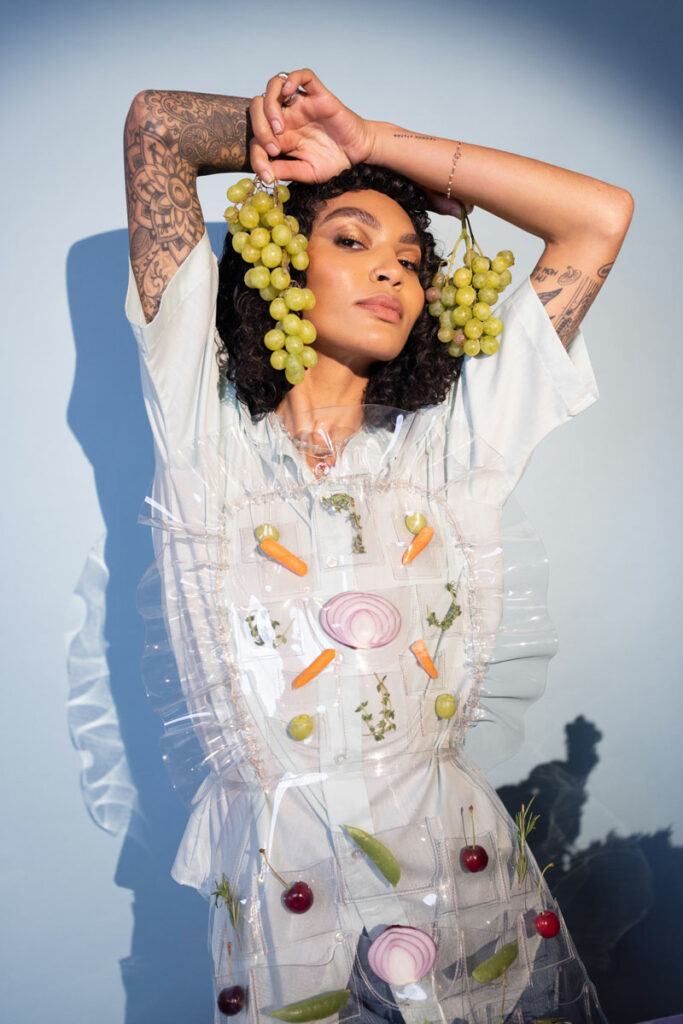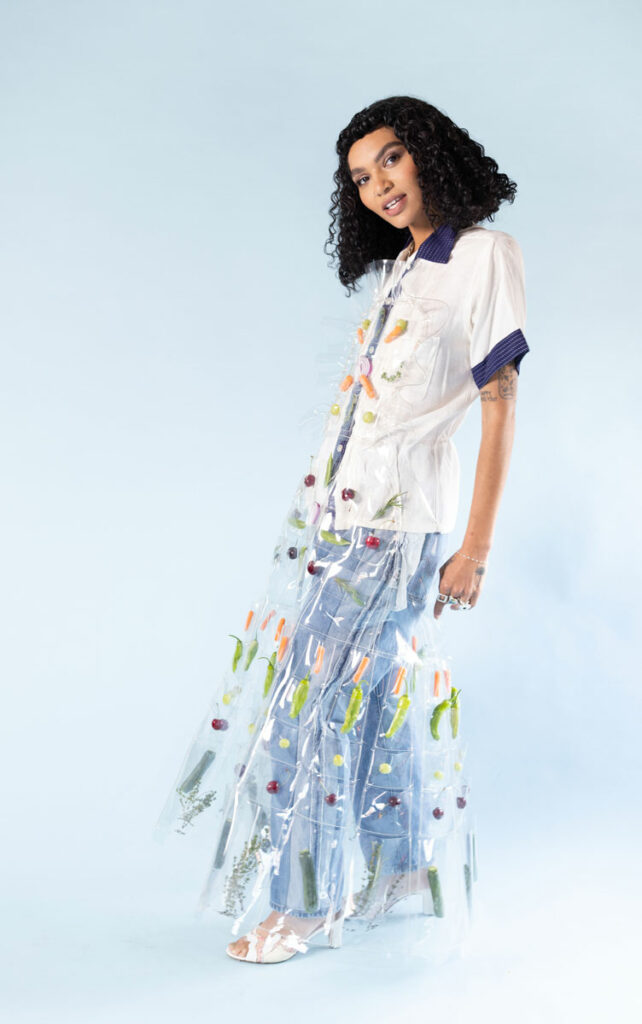Sophia Roe is huddling over an electric burner in the midst of frying donuts; the smell of sizzling oil warms the already-thick, muggy August air as I enter Apartment Miso, her Bushwick loft where she does her cooking.
While some might avoid deep frying in August, Roe has made a name for herself by going against the grain. The sweet rewards speak for themselves.
“When you tell people you paint, they’re, like, ‘Oh you have a paint studio,’ but when I tell people I have a culinary studio, they don’t understand it,” she says. “It feels like a restaurant, but I don’t have payroll, and I can show up whenever I want.” It’s here that she develops recipes and cooks for client dinners, magazine articles, “Counter Space” (her food show on VICE TV), and to share on her Instagram and TikTok platforms. It’s also where she explores more personal recipes for her home or for books she hopes to someday publish. Instead of paintbrushes and canvases, it’s spatulas, spoons, and, yes, tweezers; there are plenty of brushes, too, but they’re more likely for painting with sauces rather than gouache. One day Roe might be making tempura out of scarlet runner blossoms; another day she’ll be soaking pears in an overnight bath of hibiscus leaves, ginger, and pink peppercorns. Plants and fungi are vital colors in her palette.

Things need to have a purpose in Apartment Miso, even if that purpose is having fun. No food goes to waste: Often ingredients will be dehydrated for later, while discards might become decoration, like the dried pepper garlands that hang from a ceiling pipe. “We love rotten food over at Apartment Miso. Just because it’s past the point of consumption doesn’t mean it’s not edible for the eyes.”
After years of working in professional kitchens—something that began as a job of necessity—and as a private chef, Roe has found it liberating to be able to finally express her individual aesthetic, both through her style and cooking. She finds that total freedom of expression is key to making better food. Still, there’s a tension within her about her style being perceived as frivolous in food spaces, as in: “I can’t go to Fashion Week and be a good cook,” but that, she says, may just be in her head.
Roe says, “As a cook your job is to make food delicious as a baseline. I don’t care how beautiful or cool it is, that shit better be delicious.” Beyond flavor, she also wants people to think about “the labor that goes into growing food before it gets to a chef’s hands… from the people who transport the food, to the farmers, to the land stewards.” These are recurrent themes on “Counter Space”: From an episode on inequities in school lunches to another discussing systemic racism in our food systems, Roe consistently pushes her viewers to think about the ways food touches race, politics, class, and the environment.
Abundance—like the explosion of ingredients and the tools to play with them inside Apartment Miso—extends to her loved ones, whom she literally keeps close. The phrase “too many cooks in the kitchen” isn’t in Roe’s vocabulary. That day we’re joined by her partner, Chris, who surprised Roe by creating an Instagram account for Apartment Miso last fall; there, he documents the behind-the-scenes of Roe’s world. Also in tow is his son, Kenzo, and Roe’s production director, assistant, and chief confidante, Dani.
The Emmy-nominated producer and television host of “Counter Space” won a James Beard Award this year in the “Emerging Voice” category, something that Roe never expected as someone whose work is outside the traditional framework of restaurants.
But for Roe’s Instagram followers—nearly 500,000 of them—her voice is not so much emerging as a comforting constant. Known for her vulnerability, her social media reads like a diary, in defiance of other food accounts that erase the blemishes of daily life. It’s easy for people to feel like they know Roe, or at least a version of her.
At 33, she’s done trying to fit in and she doesn’t care if it’s uncool to spill her guts. She sees sharing stories about her experience as crucial to understanding her cooking—be it about growing up in foster care, the pressures of being online, messing up a recipe, or the puzzled responses of people at NY Fashion Week when she asks them which bread they like. It can be exhausting to maintain her audience with Instagram’s changing algorithms; it’s been widely reported how IG’s pivot to video has diminished some food creators’ visibility on their followers’ feeds. But with the increasing support of her fans, Roe is done feeling like she has to play by Instagram’s rules or present a certain way to be taken seriously.

Social media success can be fleeting. Given its lack of dependability, Roe sees no reason to be fake or to disguise when she’s feeling sad. In the end, no matter how many followers Roe has gained (or lost) from her cooking, she’s always had to rely on herself first. “You know, I’ve only had to trust myself, I didn’t grow up trusting my parents—I trust my mom the least—so it’s been a good and bad experience, because I didn’t have anyone to impress,” she says.
Despite her accolades, Roe says she often feels out of place in social settings and doesn’t want perceived confidence to be a mask: “I’m at this middle space in a Venn diagram where I’m cooking for events, but now also getting invited to events; it’s very high-low,” she says. “I didn’t grow up around wealth, and in a lot of ways, when I wear a gown, I don’t feel like I deserve to wear it—it’s much more comfortable for me to roll up in overalls.”
Just recently, she posted on Instagram about her struggles making friends in adulthood, asking her followers if they’d be interested in a meet-up.
“I think one of my superpowers is pulling out everyone’s regular,” she says, adding that she doesn’t like asking strangers about their careers, money, or dating—status-establishing questions especially common at New York gatherings.
When she feels social anxieties, Apartment Miso is a place to retreat and take time to reflect on more than just cooking.
It’s been a refuge where Roe can—without it sounding cliché—find healing through the celebration of her regular.
She’s working on a book—decidedly not a cookbook, though it will naturally include some recipes—about her life. It’s a project that she’s in no rush to finish and she is understandably guarded about discussing its details. In part, that’s because she doesn’t want to pressurize something so personal, one that requires her to revisit traumatic memories.
“The recipes in it will be things I dreamt of eating. As a kid I always wanted to go to a carnival because I wanted to have those big, gorgeous funnel cakes, so the book has a funnel cake recipe.” The book will also include her cooking failures. “Like these donuts are a recipe failure,” she says, motioning to a wobbling stack of donuts on a baking tray. “I didn’t let them rise long enough, so they’re not as big as they should be, but I think they taste better. They’re a crispier donut.”
She breaks from the interview to turn to Kenzo, who’s playing with the leftover dough. “It looks amazing! This is so cool. Can I take a picture of it?” she asks. Turning back to me, she says, “Play is so important. This right here is what makes you grow up to be an interesting person.”



